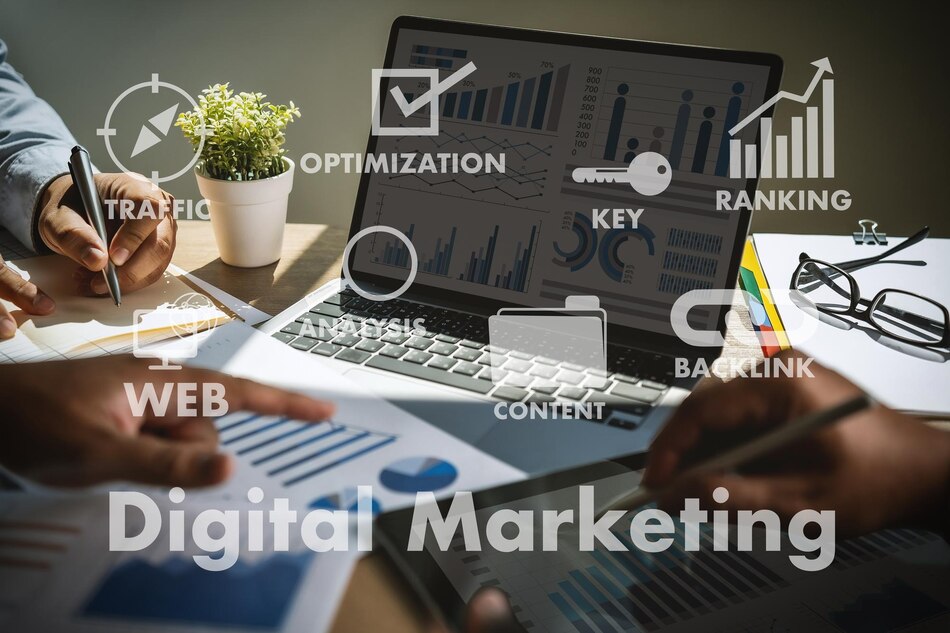Demystifying Digital Markiting A Beginner’s Guide to Implementing Effective Strategies

In today’s fast-paced digital world, businesses are constantly seeking ways to stand out amidst the online noise and reach their target audience effectively. Digital marketing has emerged as a powerful tool to achieve these goals, offering a wide range of strategies and tactics to connect with potential customers. Whether you’re a seasoned marketer or a novice entrepreneur, understanding the fundamentals of digital marketing is essential for success in the digital landscape.
What is Digital Marketing
Digital marketing encompasses all marketing efforts that utilize electronic devices and the internet to promote products or services. Unlike traditional marketing, which relies on offline channels such as print ads or television commercials, digital marketing leverages online platforms like search engines, social media, email, and websites to engage with consumers.
Key Components of Digital Marketing
Search Engine Optimization SEO
SEO involves optimizing your website to rank higher in search engine results pages SERPs organically. By optimizing elements such as keywords, meta tags, and backlinks, businesses can improve their visibility and attract more organic traffic. SEO is crucial for driving long-term, sustainable traffic to your website.
Content Marketing
Content marketing focuses on creating and distributing valuable, relevant content to attract and retain a specific audience. This content can take various forms, including blog posts, articles,videos, infographics, and podcasts. The goal of content marketing is to provide valuable information to consumers while subtly promoting products or services.
Social Media Marketing
Social media marketing involves leveraging social media platforms like Facebook, Instagram, Twitter, and LinkedIn to connect with your target audience. Businesses can use social media to share content, engage with followers, run advertisements, and build brand awareness. Social media marketing is an excellent way to humanize your brand and foster meaningful relationships with customers.
Email Marketing
Email marketing involves sending personalized messages and promotional content to a list of subscribers via email. It’s an effective way to nurture leads, promote products or services, and drive conversions. Email marketing allows businesses to deliver targeted messages directly to their audience’s inbox, making it a highly cost-effective marketing strategy.
Pay-Per-Click Advertising PPC
PPC advertising involves paying a fee each time someone clicks on your ad. Platforms like Google Ads and Facebook Ads allow businesses to create targeted ads that appear at the top of search engine results or in users’ social media feeds. PPC advertising offers precise targeting options, instant visibility, and measurable results, making it an integral part of many digital marketing campaigns.
Influencer Marketing
Influencer marketing involves partnering with influential individuals on social media to promote your products or services. These influencers have large, engaged followings, making them valuable allies for businesses looking to reach new audiences. Influencer marketing is especially effective for targeting niche markets and driving authentic engagement.
Analytics and Data Analysis
Analytics and data analysis play a crucial role in digital marketing, allowing businesses to measure the performance of their campaigns and make informed decisions. Tools like Google Analytics provide valuable insights into website traffic, user behavior, and conversion rates. By analyzing this data, businesses can optimize their marketing strategies for better results.
The Benefits of Digital Marketing
Increased Visibility and Reach
Digital marketing allows businesses to reach a global audience with minimal effort and cost. With the right strategies in place, you can increase your brand’s visibility and reach potential customers across different channels and platforms.
Targeted Advertising
One of the key advantages of digital marketing is its ability to target specific demographics and audiences. Whether you’re targeting based on age, location, interests, or behavior, digital marketing offers precise targeting options to ensure your message reaches the right people at the right time.
Cost-Effectiveness
Compared to traditional marketing channels, digital marketing is often more cost-effective, allowing businesses to achieve better results with smaller budgets. With tools like social media advertising and email marketing, you
Unlike traditional marketing methods, digital marketing can reach thousands of potential customers without breaking the bank.
Measurable Results offers real-time analytics and tracking capabilities, allowing you to measure the success of your campaigns accurately. You can track metrics such as website traffic, conversion rates, and return on investment (ROI) to gauge the effectiveness of your marketing efforts.
Improved Customer Engagement
Digital marketing enables businesses to engage with customers in real-time and build meaningful relationships through social media, email, and other online channels. By listening to customer feedback and responding promptly to inquiries, you can foster trust and loyalty among your audience.
Getting Started with Digital Marketing
Define Your Goals
Before diving into digital marketing, it’s essential to define your goals and objectives. Whether you’re looking to increase brand awareness, drive website traffic, or boost sales, having clear goals will help guide your marketing strategies and measure success.
Know Your Audience
Understanding your target audience is critical for crafting effective digital marketing campaigns. Conduct market research to identify your audience’s demographics, interests, and pain points, then tailor your messaging and content to resonate with their needs and preferences.
Choose the Right Channels
With numerous digital marketing channels available, it’s essential to select the ones that align with your goals and target audience. Consider factors such as platform demographics, advertising options, and content formats when choosing where to focus your efforts.
Create Compelling Content
Content is at the heart of digital marketing, so invest time and resources into creating high-quality, engaging content that resonates with your audience. Whether it’s blog posts, videos, or social media updates, aim to provide value and solve problems for your customers.
Monitor and Measure Performance
Regularly monitor the performance of your digital marketing campaigns using analytics tools and metrics. Identify what’s working well and what areas need improvement, then adjust your strategies accordingly to optimize results over time.
Stay Updated
The digital marketing landscape is constantly evolving, with new trends, technologies, and algorithms emerging regularly. Stay informed about industry developments and best practices to ensure your strategies remain effective and competitive.
In conclusion, digital marketing offers businesses of all sizes the opportunity to reach and engage with their target audience in meaningful ways. By understanding the key components, benefits, and best practices of digital marketing, you can develop effective strategies to grow your brand, drive sales, and achieve your business objectives in the digital age.









